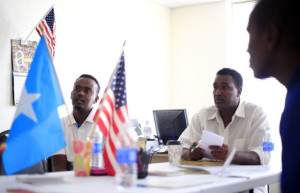Somali refugees work together to settle into new life in North Dakota

Fathia Garad has a full plate as it is with four young children, one of whom is deaf.
On top of it all, she is still adjusting to life in the United States, after having immigrated from Ethiopia — where she and family fled after civil war broke out in her native Somalia — to East Grand Forks with her husband in 2012.
She takes English lessons at Northland Community and Technical College — lessons that have a six-month to year-long waiting list for residents across the Red River in North Dakota — but speaking is still a challenge. She hopes the lessons will open up doors in the workplace.
Then there’s sign language, which she is learning with their 18-month-old daughter.
The toddler already knows how to make several signs, like the sign for “milk,” says Garad, squeezing one hand open and closed.
“I have a lot of work to do,” Garad laughs.
Somalis come from a country ravaged by two decades of civil war. In 1991, a coup d’etat overthrew the country’s 22-year autocratic ruler and left a power vacuum, plunging the country into civil war. Until 2012, Somalia had no central government. In the interim, millions of Somalis fled, crossing the country’s borders as refugees into the neighboring countries of Djibouti, Ethiopia and Kenya.
The U.S. has invited Somali refugees to its shores since the late ’80s, and Somalis make up one of the principal refugee populations in North Dakota. Some, like Garad, have come straight from east Africa — more than 8,000 miles away — while other refugees migrated from elsewhere in the United States to job-rich North Dakota in pursuit of greener pastures.
The transition is far from instantaneous, and, though new arrivals receive initial support from groups like Lutheran Social Services, acculturation takes months, if not years.
“It’s like drinking from a fire hydrant,” said Katie Dachtler, resettlement coordinator of Lutheran Social Services. “You’re not getting much.”
Community support
That is where members of the Somali community, including Yasmin Awad, step in.
Awad, who speaks both Somali and English fluently, volunteers as an interpreter and acts as a cultural conduit.
She says the new arrivals in particular are at a handicap, often knowing little to nothing of the language. Four Somali families just arrived in Grand Forks in the last two weeks.
“These people need attention,” she said.
Without people like Awad, they might not get that attention. Lutheran Social Services is limited in the amount of assistance it can provide and it does not employ a full-time, Somali-speaking social worker.
Awad helps relay need-to-know information: how to call 911 in case of an emergency and what to say, using short phrases like “Fire” or “Help me.”
New arrivals have called on her interpretation skills after calling the police or when going to doctor or hospital visits, she said. She has also helped Somalis apply for driver’s licenses and just learned last week the written driver’s test is offered in Somali.
Awad has also volunteered as a babysitter, which can be hard to come by for parents, Awad says.
Garad is among those parents. In Somalia, she would have her mother, sisters and aunts to help look after the kids, but here, she is without that support system.
The problem also stems from a wariness on the part of Somali mothers to entrust their children to non-Islamic caregivers. Awad instructs them to communicate with the babysitters to let them know, for example, not to feed the kids pork, as is forbidden in Islam.
Creating community
Mohamed Ismail, meanwhile, is a founder of the recently established nonprofit Somali Community of Grand Forks.
In its nine months of life, the organization has started two youth soccer teams, which compete with Somali teams in the region, something Ismail says is important to giving young Somalis something to do.
Some mothers, like Garad, are wary of letting their children go outside, for fear for their safety.
“I don’t feel comfortable to send them outside,” Garad said.
The soccer club gives them a peace of mind, knowing their children are in safe hands.
The nonprofit also collected donations from the community and in July, held the first community celebration of Eid al-Fitr in Grand Forks, the holiday marking the end of Ramadan, an Islamic holy month during which Muslims keep a strict fast in the daylight hours. Somalis typically would travel to Fargo or Minneapolis to celebrate Eid, Ismail said.
Aside from cultural connectivity, Ismail also hopes to address education gaps among Somali children and adults through a JumpStart program to catch middle- and high-schoolers up with the curriculum and through ESL classes to teach adults English.
As a Minnesota resident, Garad had an easier time securing a spot in ESL — or English as a second language — classes. In turn, North Dakota residents must wait six months to a year before Northland College enrolls them in ESL classes.
The Adult Learning Center in Grand Forks does offer ESL classes, but not during the summer, said Dachtler, the Lutheran Social Services employee. And class space is limited.
Dachtler said one Grand Forks church also offers English lessons, though the curriculum is heavily based in Christianity.
The hope is for integration, says Ismail.
One day, they hope, the fire hydrant from which they were once trying to quench their thirst by will no longer be there. Instead, they will be drinking from a water glass.